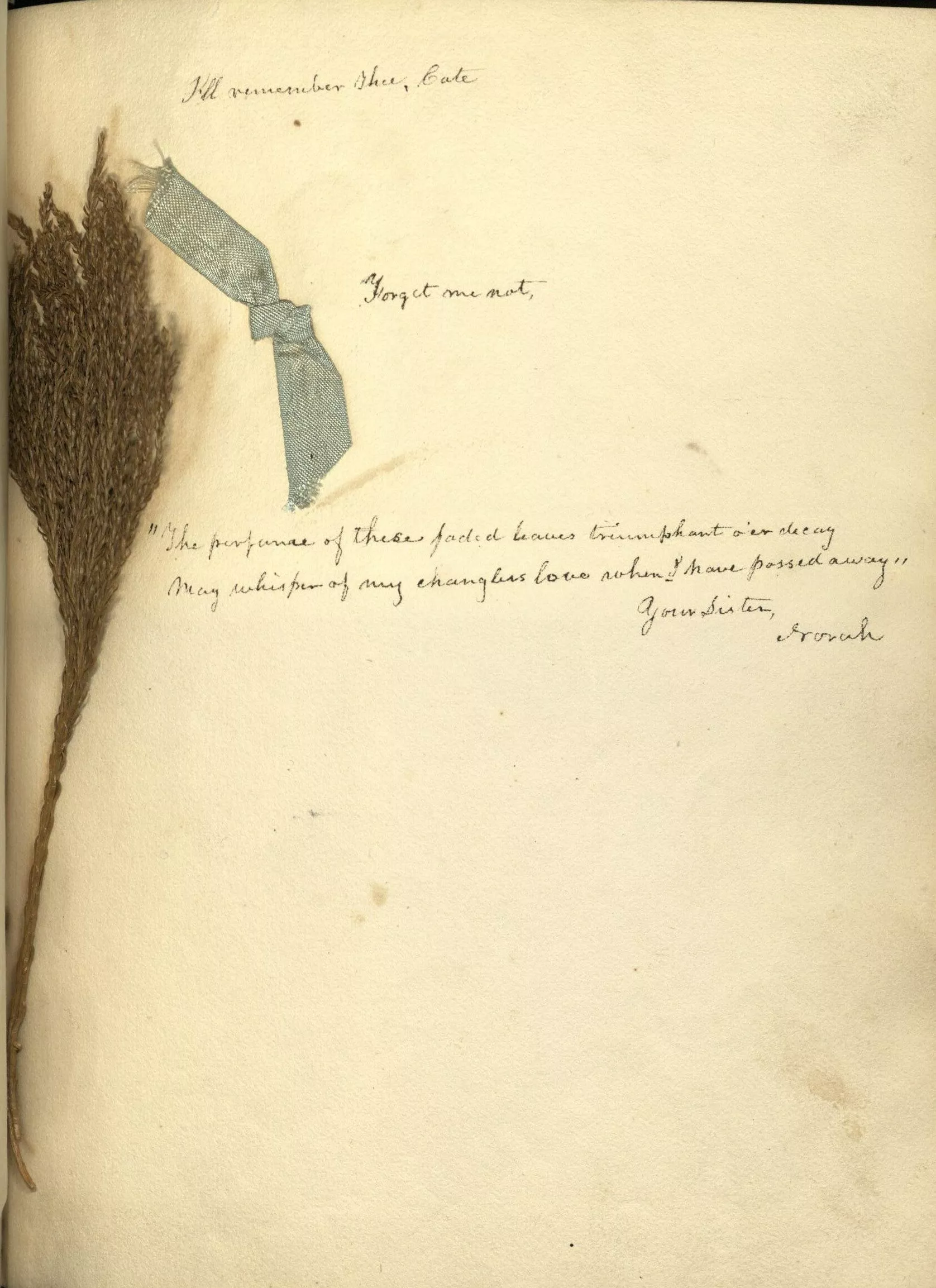Creation Date
1827–1841
Height
21 cm
Width
16 cm
Medium
Genre
Description
On a page located near the halfway point of an album that was kept between 1827 and 1841 by a Miss Catharine Eliza Lowe, several lines handwritten in black ink accompany a blue ribbon and a pressed cutting of a plant, probably a fern. Perforations have been made in the page that allow the ribbon to be threaded through it and tied in a knot. The pressed plant specimen may once have been pasted onto the page but is detached now. It and the ribbon have each left ghostly imprints of their shapes on both this page and the page opposite.
Across the page, with large spaces left between the lines, is an inscription addressing Catharine Lowe, and written by her sister, Norah. “I’ll remember thee, Cate,” she writes at the top of the page, and then, leaving a blank space below this promise, adds, “Forget me not.” Further down the page are two lines of verse placed in quotation marks—“The perfume of these faded leaves triumphant o’er decay, / May whisper of my changeless love when I have passed away”—followed by a signature, “Your Sister, / Norah.” The couplet inside the quotation marks originates in a poem written by Alaric A. Watts and published in the 1828 number of the literary annual The Literary Souvenir; or Cabinet of Poetry and Romance, which Watts also edited.
In British book history, Watts often gets credited as one of the inventors of the literary annual, the innovative book type that imported into the sphere of print publication several dimensions of the manuscript culture for which the album was a hub. Presenting itself as the collaborative work of an editor and of the famous friends who had donated to his or her book, the annual mimicked the manuscript album’s origin in the gift exchanges connecting and sustaining a circle of intimates (contributors to the commercialized annuals received payment for their work, but publishers promoted the idea that gift transactions rather than the pursuit of profit shaped their dealings). The emphasis that the verses selected or composed for albums placed on remembrance and on the material traces that foster it reappeared in the original content commissioned for the annuals. (Indeed, the resonantly titled "Forget-Me-Not," launched in 1822 in time for the Christmas market, is generally considered the first of the annuals.) But participants, both American and British, in the manuscript culture of the album also borrowed in their turn from the printed annuals, as Norah’s appropriation of Watts’s “You Ask Me For a Pledge, Love” suggests.
Excerpted and so made part of the collage of cut-up, clipped things that has been assembled on this page, Watts’s poem has here been turned to new ends and takes on new meanings. The deixis used by the speaker of the poem who, as a token of constancy, has reluctantly offered her (male?) interlocutor “this” flower and has referenced “these faded leaves” operates very differently when the words “these faded leaves” are encountered on the page alongside an actual, desiccated bit of plant matter. And these two lines, once inscribed into the album, themselves become the pledge that they are about.
To page through Catharine Lowe’s album is to encounter additional evidence of how print and manuscript cultures intersected in the early nineteenth century. The collage created by hand on this page supplements the printed engravings of various local beauty spots (Lake Ticonderoga in upstate New York, the Passaic Falls in New Jersey) that the New York based manufacturer of this album, J. C. Riker, commissioned as ornaments for the albums he marketed. These engravings are interspersed among the book’s blank leaves. One such landscape print is found, right above Riker’s colophon, on the album’s title page: it reads “J. C. Riker—New-York.” This page has, however, been customized through the addition, above and below the printed text and image, of some elegant pen-work, which reads “Miss Catharine Lowe / New York 1834,” and which communicates an alternative message about just whose book this is.
Publisher
J. C. Riker, New York
Collection
Accession Number
Ms Am 889.185
Additional Information
Details on creation: The collage contains a pressed plant specimen and a fabric ribbon.
Place of creation: likely New York City
Provenance: Bequest of Evert Jansen Wendell, 1918

